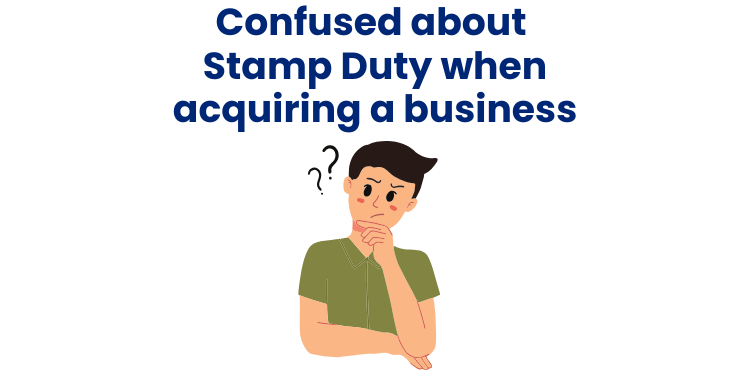Acquiring a business in Australia involves various financial and legal considerations, including whether stamp duty is payable on the transaction. Stamp duty, also known as transfer duty, is a tax imposed by state and territory governments on certain transactions, including business acquisitions. However, the applicability of stamp duty depends on the nature of the transaction, the type of assets involved, and the location of the business. This guide explores the relevant laws, potential issues, and the professionals’ buyers should consult when purchasing a business in Australia.
1. Buying Business Assets (Including Goodwill, Stock, Equipment, etc.)
In most Australian states and territories, stamp duty is no longer levied on the transfer of business assets, except for real property. However, Western Australia (WA) and the Northern Territory (NT) are exceptions where stamp duty may still apply to goodwill and intellectual property.
1.1 State-by-State Overview
- New South Wales (NSW), Victoria (VIC), Queensland (QLD), South Australia (SA), Tasmania (TAS), and the Australian Capital Territory (ACT): No stamp duty on business asset transfers.
- Western Australia (WA): Stamp duty applies to the transfer of business goodwill and intellectual property.
- Northern Territory (NT): Stamp duty applies to the transfer of business goodwill and intellectual property.
1.2 Real-Life Example
John purchases a small café in Sydney, NSW, acquiring its goodwill, stock, and equipment. Since NSW does not impose stamp duty on business asset transfers (excluding real estate), John does not need to pay stamp duty. However, if he purchased a similar café in Perth, WA, he might be required to pay stamp duty on the goodwill and intellectual property components of the sale.
1.3 Issues That May Arise
- Valuation disputes: Determining the value of goodwill and intellectual property can be complex.
- Inconsistent tax treatment: Differences between states create uncertainty for buyers.
- Unclear contractual terms: Buyers should ensure sale agreements specify asset valuations to avoid unexpected duty liabilities.

2. Buying Real Property as Part of the Business Purchase
When acquiring a business that includes real estate, stamp duty applies to the real property portion of the transaction. Each state and territory sets its own rates and thresholds.
2.1 State-Based Stamp Duty on Real Property
- NSW: Stamp duty applies at progressive rates, with concessions for certain transactions.
- VIC: Duty is based on the dutiable value of the property.
- QLD: Transfer duty is calculated on a sliding scale.
- SA, WA, TAS, NT, ACT: Stamp duty is applicable to the property component based on state-specific rates.
2.2 Real-Life Example
Sarah buys a retail store in Melbourne, VIC, which includes a commercial property worth $1 million. She must pay stamp duty based on VIC’s property transfer duty rates. However, if she only purchased the store’s stock, goodwill, and equipment without real estate, no stamp duty would be payable.
2.3 Issues That May Arise
- Misclassification of assets: Sellers may attempt to undervalue real property to reduce stamp duty.
- Financing considerations: Stamp duty increases the cost of acquisition.
- Legal and tax implications: Buyers must ensure the contract correctly reflects asset values.

3. Buying Shares in a Company (Share Sale vs. Asset Sale)
Purchasing shares in a company that owns a business can be an alternative to acquiring business assets directly. Generally, stamp duty does not apply to share transfers unless the company holds significant land assets, triggering landholder duty.
3.1 Landholder Duty Considerations
- If the company owns land above a specified threshold (varies by state), landholder duty applies.
- Each state has different rules and thresholds for landholder duty.
3.2 Real-Life Example
Tom acquires a 100% shareholding in a company that owns a hotel in Brisbane, QLD, including the land. Because the company owns substantial real property, landholder duty is triggered, and Tom must pay stamp duty on the land component.
3.3 Issues That May Arise
- Hidden liabilities: Share purchases may include undisclosed company debts.
- Complexity in valuation: Determining the proportion of land value subject to landholder duty.
- Legal structuring: Buyers must assess whether an asset or share purchase is more tax-efficient.

4. Relevant Legislation
Stamp duty laws vary across states and territories, with key legislation including:
- Duties Act 1997 (NSW)
- Duties Act 2000 (VIC)
- Duties Act 2001 (QLD)
- Duties Act 1999 (ACT)
- Duties Act 1997 (SA)
- Duties Act 2008 (WA)
- Duties Act 2001 (TAS)
- Duties Act 2000 (NT)
5. Seeking Professional Advice
When acquiring a business, seeking professional advice is crucial to understanding stamp duty implications and structuring the transaction efficiently.
5.1 Professionals to Consult
- Business Brokers: Assist with negotiations and transaction structuring.
- Accountants: Provide tax advice and financial due diligence.
- Solicitors: Ensure compliance with legal requirements and draft contracts.
- Valuers: Determine the value of goodwill, intellectual property, and real estate.
- Tax Advisors: Guide on structuring purchases to minimize tax liabilities.
Conclusion
Stamp duty on business acquisitions in Australia depends on the transaction type, asset composition, and location. Buyers should be aware of the differences between states, particularly in WA and NT, where duty applies to goodwill and intellectual property. The purchase of real property triggers stamp duty in all states, while share transactions may be subject to landholder duty if the company owns significant land. Seeking professional advice ensures compliance with legislation and optimizes tax efficiency.
At Broker.com.au, we’re dedicated to helping business owners secure the best finance solutions to support their growth. Contact us anytime to see how we can assist you—call 1300 373 300 or email [email protected].
To explore more resources and gain insights into securing business loans and other financial solutions, visit our comprehensive Resources & Learning page.




